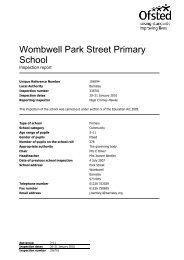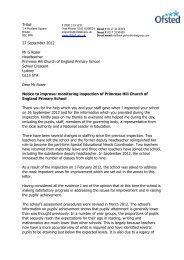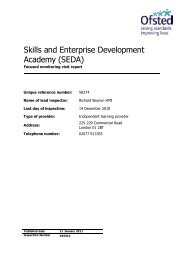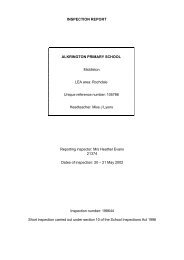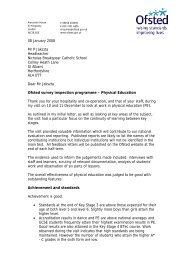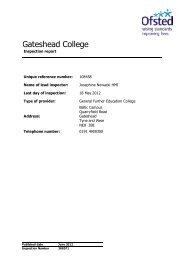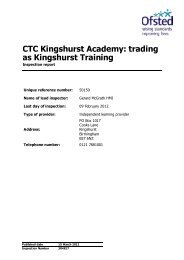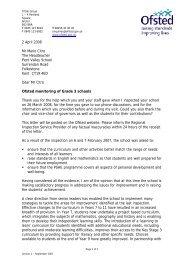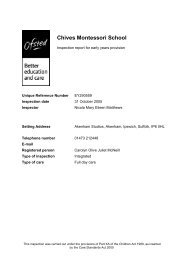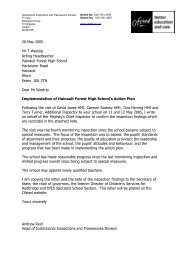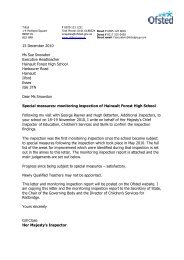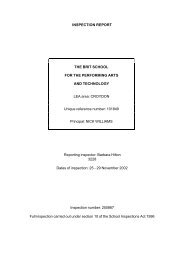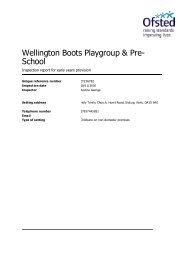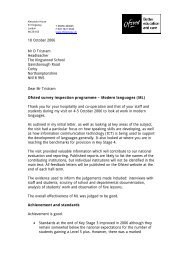Annex B: the Childcare Register - Ofsted
Annex B: the Childcare Register - Ofsted
Annex B: the Childcare Register - Ofsted
You also want an ePaper? Increase the reach of your titles
YUMPU automatically turns print PDFs into web optimized ePapers that Google loves.
Inspection Report: Yarrow House Nursery School, 18/07/2011<br />
are not best used and staff deployment at such times is not effective.<br />
The partnership with parents is excellent. Information is both ga<strong>the</strong>red from, and<br />
shared with, parents to ensure that <strong>the</strong> changing or developing needs of children<br />
are continually met. Parents have excellent opportunities to contribute to <strong>the</strong>ir<br />
child's learning and development through ongoing access to <strong>the</strong>ir child's learning<br />
profile, parents' evenings and daily discussion with staff. There are many examples<br />
of <strong>the</strong> ways parents participate in nursery activities, including being invited to<br />
submit ideas for <strong>the</strong> planning of activities and participating in <strong>the</strong> parents' group<br />
which is discusses <strong>the</strong> organisational aspects of <strong>the</strong> nursery life. Parents and<br />
extended members of <strong>the</strong> families are invited to share <strong>the</strong>ir skills to enhance<br />
children's experiences, for example giving guidance with <strong>the</strong> gardening activities<br />
and reading stories. Parents are extremely pleased that <strong>the</strong>ir children are happy at<br />
<strong>the</strong> nursery and comment that <strong>the</strong>y are 'amazed' with <strong>the</strong>ir progress. Strong links<br />
are in place with schools that children will attend to make <strong>the</strong>ir transition to <strong>the</strong>ir<br />
next stage of education happy. This includes visits to <strong>the</strong> nursery from <strong>the</strong> feeder<br />
schools to enable children to meet <strong>the</strong>ir new teachers, using photographs and<br />
school webb sites on <strong>the</strong> internet to support children's understanding of <strong>the</strong> new<br />
setting <strong>the</strong>y will be attending. Ongoing contact systems are in place to share<br />
information with o<strong>the</strong>r providers delivering <strong>the</strong> Early Years Foundation Stage to<br />
nursery children. Staff effectively use this information to complement children's<br />
learning experiences to promote <strong>the</strong>ir development.<br />
The quality and standards of <strong>the</strong> early years provision<br />
and outcomes for children<br />
Children make good progress in this stimulating environment. Key persons know<br />
<strong>the</strong>ir children well and are aware of <strong>the</strong>ir individual needs, interests and<br />
preferences. Staff strive to ensure that children have fun and enjoy all aspects of<br />
<strong>the</strong>ir time in <strong>the</strong> nursery. Children have trusting relationships with <strong>the</strong> staff;<br />
consequently, <strong>the</strong>y play in an enthusiastic, confident and uninhibited manner.<br />
Staff observe children during play and record <strong>the</strong>ir achievements. They track<br />
children's progress using <strong>the</strong> Early Years Foundation Stage development matters<br />
guidance and plan for <strong>the</strong> next steps in learning and development. This<br />
information and knowledge of children's interest is used to formulate <strong>the</strong> weekly<br />
planning. The older children are actively involved in <strong>the</strong> planning process by<br />
putting forward <strong>the</strong>ir suggestions and ideas on what <strong>the</strong>y want to do. As children<br />
progress through <strong>the</strong> nursery staff build on <strong>the</strong> record of children's achievements<br />
to support <strong>the</strong>ir continued development. Transitional arrangements are in place to<br />
help children as <strong>the</strong>y move onto <strong>the</strong>ir next care room. At this point <strong>the</strong>ir new key<br />
person completes a detailed assessment across <strong>the</strong> six areas of learning. However,<br />
a similar system is not used when older children commence at <strong>the</strong> nursery to<br />
establish <strong>the</strong>ir starting points to inform <strong>the</strong> initial planning across <strong>the</strong> six areas of<br />
learning.<br />
Children develop skills for <strong>the</strong> future through <strong>the</strong> range of activities provided such<br />
as, exploring technology by using <strong>the</strong> computer wall board, programmed and<br />
This inspection was carried out under sections 49 and 50 of <strong>the</strong> <strong>Childcare</strong> Act 2006<br />
6



